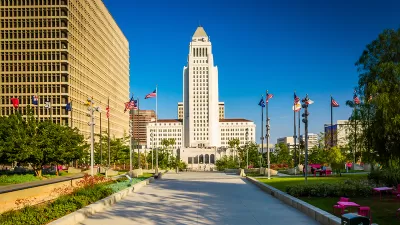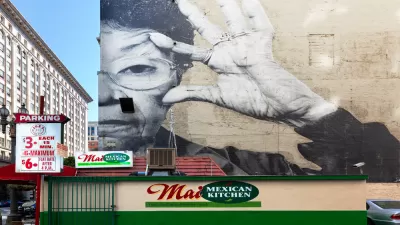Two major ballot initiatives would change the state of planning and development in L.A. As the housing and planning crisis reaches new levels, initiative leaders and land-use experts discuss how to create a viable path forward.

On April 27, the UCLA Ziman Center for Real Estate hosted a forum with The Planning Report and the Urban Land Institute-Los Angeles to discuss the state of planning in Los Angeles and competing planning initiatives currently under consideration in the city. The forum, titled "Never Let a Good Crisis Go to Waste," brought together key stakeholders from all sides of the issue.
Video from the forum can be found here. The forum focused on the underlying issues raised by the Neighborhood Integrity Initiative, which has potentially sweeping implications for large-scale development in the city of Los Angeles, and is being targeted for the March 2017 Los Angeles citywide election. Jill Stewart, Campaign Director for the Coalition to Preserve Los Angeles (backing the Neighborhood Integrity Initiative), explained:
(T)he guts of our measure is to force (the Mayor and City Council) to update the General Plan…We’re forcing them to link (planning) with growth for the first time in decades. That is the key issue in the Neighborhood Integrity Initiative. The moratorium is a wake-up slap in the face.
Discussants remarked on the state of the planning process in the city of Los Angeles, and on creating a viable path forward for addressing historic homelessness and housing affordability issues. The forum also discussed the Build Better LA affordable housing ballot measure, brought forward by a coalition of labor groups. Rusty Hicks, Executive Secretary-Treasurer of the Los Angeles County Federation of Labor, AFL-CIO, described the rationale for a competing ballot measure:
When we put Build Better LA forward, it was never envisioned to be the be-all-end-all solution to addressing housing. There’s a funding issue, there’s a process issue, there’s a planning issue, there are a number of other issues that many others are having conversations on and working on. We see this as a particular issue that others have not stepped forward on. We as organized labor have to be at the table because it affects so many workers, whether they have the benefit of a union or not.
Panelists also opined on the impacts of Mayor Eric Garcetti's call to revise the city's community plans by 2026, which would set the allowable size and density of development projects in neighborhoods throughout the city. Former member of the Los Angeles County Board of Supervisors and City Council member Zev Yaroslavsky also commented on the Mayor’s plan, explaining:
It falls way too short given the situation we’re in. A 10-year horizon is not short enough…The concept of having a plan redo in a time certain is good, but in the meantime-the spot zoning loophole remains in force. In order to be credible, the city has to plug that loophole while these discussions take place with stakeholders.

Planetizen Federal Action Tracker
A weekly monitor of how Trump’s orders and actions are impacting planners and planning in America.

Congressman Proposes Bill to Rename DC Metro “Trump Train”
The Make Autorail Great Again Act would withhold federal funding to the system until the Washington Metropolitan Area Transit Authority (WMATA), rebrands as the Washington Metropolitan Authority for Greater Access (WMAGA).

The Simple Legislative Tool Transforming Vacant Downtowns
In California, Michigan and Georgia, an easy win is bringing dollars — and delight — back to city centers.

The States Losing Rural Delivery Rooms at an Alarming Pace
In some states, as few as 9% of rural hospitals still deliver babies. As a result, rising pre-term births, no adequate pre-term care and "harrowing" close calls are a growing reality.

The Small South Asian Republic Going all in on EVs
Thanks to one simple policy change less than five years ago, 65% of new cars in this Himalayan country are now electric.

DC Backpedals on Bike Lane Protection, Swaps Barriers for Paint
Citing aesthetic concerns, the city is removing the concrete barriers and flexposts that once separated Arizona Avenue cyclists from motor vehicles.
Urban Design for Planners 1: Software Tools
This six-course series explores essential urban design concepts using open source software and equips planners with the tools they need to participate fully in the urban design process.
Planning for Universal Design
Learn the tools for implementing Universal Design in planning regulations.
Smith Gee Studio
City of Charlotte
City of Camden Redevelopment Agency
City of Astoria
Transportation Research & Education Center (TREC) at Portland State University
US High Speed Rail Association
City of Camden Redevelopment Agency
Municipality of Princeton (NJ)





























